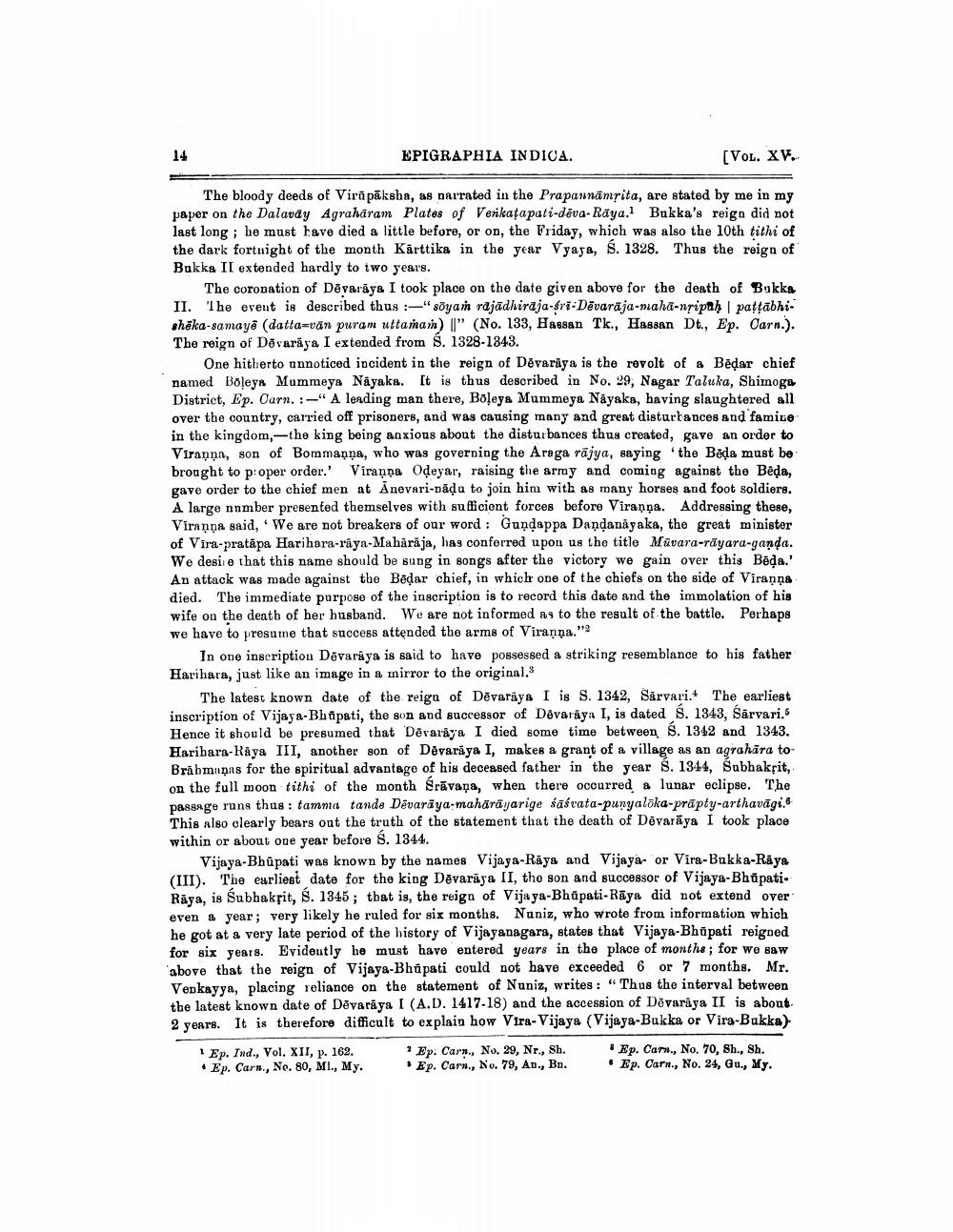________________
EPIGRAPHIA INDICA.
[Vol. XV.
The bloody deeds of Virāpāksha, as narrated in the Prapannāmsita, are stated by me in my paper on the Dalavdy Agraharam Plates of Verkatapati-dēva-Raya. Bukka's reign did not last long; he must have died a little before, or on, the Friday, which was also the 10th tithi of the dark fortnight of the month Kárttika in the year Vyaya, s. 1328. Thus the reign of Bakka II extended hardly to two years.
The coronation of Dēvarāya I took place on the date given above for the death of Bukka II. The event is described thus :"soyam rajādhiraja-sri-Dāvarāja-niaha-ntipah pattabhi. shēka-samaya (datta=vān puram utta main) !” (No. 133, Hassan Tk., Hassan Dt., Ep. Carn.). The reign of Dovarāya I extended from S. 1328-1343.
One hitherto unnoticed incident in the reign of Devaraya is the revolt of a Bēdar chief named Boleya Mummeya Nayaka. It is thus described in No. 29, Nagar Taluka, Shimoga District, Ep. Oarn. :-"A leading man there, Boleya Mummeya Nayaka, having slaughtered all over the country, carried off prisoners, and was causing many and great disturtances and famice in the kingdom,--the king being anxious about the disturbances thus created, gave an order to Viraņņa, son of Bommanna, who was governing the Araga rājya, saying the Bēda must be brought to proper order.' Viraạna Odeyar, raising the army and coming against the Bėda, gave order to the chief men at Ånevari-pāļu to join him with as many horses and foot soldiers. A large nnmber presented themselves with sufficient forces before Viranşa. Addressing these, Viranna said, 'We are not breakers of our word : Gundappa Daņdanāyaka, the great minister of Vira-pratāpa Harihara-raya-Mahārāja, has conferred upon us the title Müvara-rāyara-ganda. We desire that this name should be sung in songs after the victory we gain over this Bēda.' An attack was made against the Bedar chief, in which one of the chiefs on the side of Viranna died. The immediate purpose of the inscription is to record this date and the immolation of his wife on the death of her husband. We are not informed as to the result of the battle. Perhaps we have to presume that success attended the arms of Viranna."
In one inscription Devaraya is said to have possessed a striking resemblance to his father Harihara, just like an image in a mirror to the original.
The latest known date of the reign of Devaraya I is S. 1342, Sárvari. The earliest inscription of Vijaya-Bhāpati, the son and successor of Dövaraya I, is dated s. 1343, Sarvari. Hence it should be presumed that Devaraya I died some time between $. 1342 and 1343. Haribara-Raya III, another son of Devaraya I, makes a grant of a village as an agrahāra to Brābmiņas for the spiritual advantage of his deceased father in the year S. 1344, Subhakrit, on the full moon tithi of the month Srāvaņa, when there occurred a lunar eclipse. The passage runs thus : tamma tande Dēvarāya-mahārāyarige śāśvata-punyaloka-prāpty-arthavāgi. This also clearly bears out the truth of the statement that the death of Devarāya I took place within or about one year before $. 1344.
Vijaya-Bhüpati was known by the names Vijaya-Raya and Vijaya- or Vira-Bukka-Raya (III). The earliest date for the king Devarāya II, tho son and successor of Vijaya-BhāpatiRāya, is Subhakrit, s. 1345; that is, the reign of Vijaya-Bhāpati-Rāya did not extend over even a year; very likely he ruled for six months. Nuniz, who wrote from information which he got at a very late period of the history of Vijayanagara, states that Vijaya-Bhüpati reigned for six years. Evidently he must have entered years in the place of months; for we saw above that the reign of Vijaya-Bhápati could not have exceeded 6 or 7 months. Mr. Vepkayya, placing reliance on the statement of Nuniz, writes: "Thus the interval between the latest known date of Děvarāya I (A.D. 1417-18) and the accession of Devaraya II is about 2 years. It is therefore difficult to explain how Vira-Vijaya (Vijaya-Bukka or Vira-Bukka)
1 Ep. Ind., Vol. XII, p. 162.
Ep. Carn., No. 80, MI., My.
Ep. Carn., No. 29, Nr., Sh. Ep. Carn., No. 79, An., Bn.
Ep. Carn., No. 70, Sh., Sh. Ep. Carn., No. 24, Gu., Yy.




